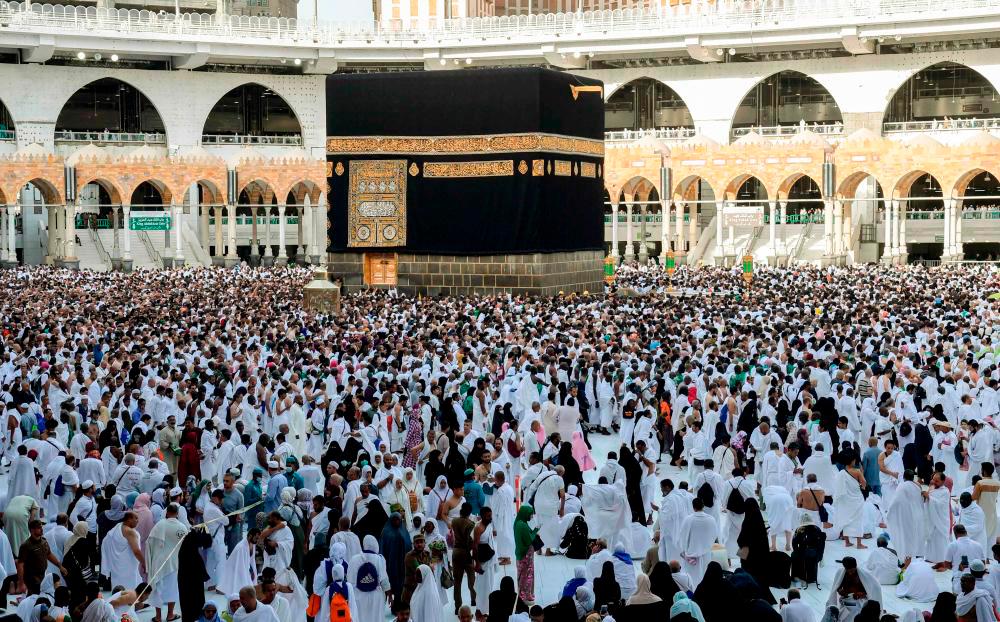KUALA LUMPUR: Prospective haj pilgrims are strongly advised to consider additional vaccinations, specifically influenza and pneumococcal vaccines, before embarking on the pilgrimage this year, according to Dr Ahmad Nizam Ismail, an Anesthesiology Specialist at the Kemaman Hospital in Terengganu.
While this is presented as optional in the Health Examination Guidelines for Prospective Haj Pilgrims Edition 9, he said these vaccines are crucial in mitigating the risk of respiratory tract infections.
Dr Ahmad Nizam, appointed by Lembaga Tabung Haji (TH) with the endorsement Ministry of Health (MOH) to lead the medical team for this year’s haj season, highlighted that respiratory tract diseases were the major contributor to illnesses among pilgrims during the last season.
“Respiratory diseases like bacterial infections and pneumonia made up 60 per cent of the outpatient cases treated at TH Clinics during the last haj season, while 49 per cent of respiratory-related issues were addressed at TH treatment centres,” he said in a recent interview with Bernama.
On Jan 8, Minister in the Prime Minister’s Department (Religious Affairs), Datuk Dr Mohd Na’im Mokhtar, announced that the Saudi Arabian government has set the quota at 31,600 pilgrims for Malaysia this Haj season.
Ahmad Nizam said that haj pilgrims aged 50 and above, smokers and/or e-cigarette users, those with respiratory conditions like asthma or obstructive pulmonary disease, and individuals with diabetes, heart, kidney, neurological issues and obesity are encouraged to take both of these optional vaccines.
Having served 12 years in the Department of Anesthesiology and Intensive Care Unit at Kemaman Hospital and 22 years in the medical field, he noted that the new testing improvements in this year’s haj guidelines could reduce the number of pilgrims affected by diseases during the pilgrimage.
“The guidelines now include the 30 Second Sit To Stand Test, which assesses the strength and endurance of the legs. Approval will be given to prospective pilgrims who can complete the test above the average rate based on age and gender.
“Similarly, the Timed Up & Go (TUG) Test evaluates walking ability and balance. Approval will be granted to those who can complete the test in under 12 seconds,” he said.
Commenting further, Dr Ahmad Nizam, who also served as a medical officer during the last haj season, said that 108 pilgrims were referred to Saudi Arabian hospitals due to critical health issues.
“Most of our pilgrims tend to fall ill due to respiratory issues,” he said.
Meanwhile, TH Haj Department senior health manager, Dr Muhammad Shafiq Samsudin, who appeared as a guest on the ‘TH Ke Udara’ podcast titled Health and Criteria for Prospective Haj Pilgrims, recently emphasised that pilgrims need to be ready to meet the health requirements and criteria set before embarking on the pilgrimage.
“For the 1445/2024 haj season, TH uses the Health Examination Guidelines for Prospective Haj Pilgrims Edition 9, replacing the Health Examination Guidelines for Prospective Haj Pilgrims Pandemic Edition. One of the changes is the body mass index criteria, which should not exceed 32.5, and individuals with uncontrolled comorbidities are not allowed to go.
“The specified blood glucose level (HbA1c) is below 8.5 per cent. Additionally, prospective pilgrims should adopt a balanced diet, engage in activities that induce sweat, undergo various physical and mental tests, and avoid smoking or e-cigarettes,” he said.
He explained that the collaboration between TH and MOH is in line with the Tabung Haji Act 1995 to ensure health examinations for every prospective haj pilgrim adhere to the established guidelines.
Dr Muhammad Shafiq clarified that prospective pilgrims who suffer from chronic diseases are high-risk and unstable and, thus, do not meet the obligatory requirements of haj (health istito’ah).
“Malaysians are fortunate because we have the MOH addressing health issues of haj pilgrims in the Holy Land, while TH takes care of their overall welfare. The health examinations are to determine the eligibility of prospective pilgrims to perform haj according to the guidelines,” he said.
He noted that approximately three million pilgrims worldwide performed haj last year, and TH found that the hot weather and overcrowding posed challenges to their health.
“Prospective haj pilgrims are advised to follow recommendations to avoid health issues, including maintaining personal hygiene, reducing exposure to sunlight and staying hydrated,” he said. -Bernama









